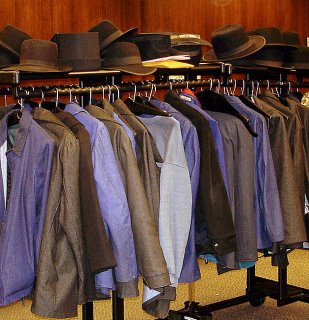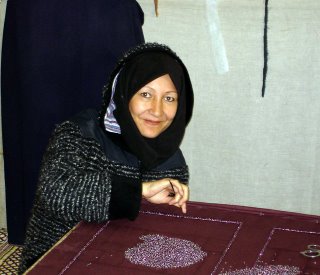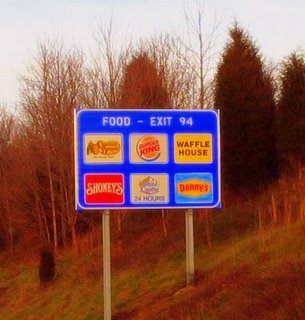Two Days with Ohio's Dairy Graziers
I slipped into the dark auditorium a few minutes late, surprised that there weren't many aisle seats open. So I groped my way along the back wall, ventured down the left side and finally slipped into an empty seat. As my eyes adjusted to the light, I saw that the rows tiering down in front of me were filled with broad shoulders in gray shirts with black suspenders. Among the gray, there were many bobbing white dots-- the bonnets of the Amish women who were there along with their husbands. For some reason, I had assumed that the two-day North Central Ohio Dairy Grazing Conference down in Wooster would be populated by aging hippies--about sixty of them. Instead, there were maybe six-hundred people there, and three-quarters were Amish.
See what the coat racks were like?
It was a really extraordinary conference-- I think that even the people who go to these things regularly would agree. Even though it was held on the grounds of the Ohio Agricultural Research and Development Center, there weren't any experts from government or academia addressing the crowd. Instead, farmers spoke to each other. These were farmers who have bucked dairy orthodoxy--locking hundreds of cows in barns and loading them up with corn--and now let their animals find their own food by roaming grasslands. They were addressing other farmers who are thinking of or just getting started doing this, often in the face of family or community doubt.
They talked about a lot of things that went way over my head--counting mounts? udder singeing? Just what kind of cow is it that "knows what she's doing"-- and what is it that cows are supposed to know? How do they manage to forget it?
But a lot of what they were talking about was quite clear. They talked about the pleasure of seeing cows live like cows, not machines. They talked about how much healthier their animals have been since they made the switch to grass farming-- one guy said his vet bills fell from $5000 to $300 one year. Several talked about how much easier grass farming is once they figure out how to do it right, how they now have more time to spend with their families and actually enjoy more of their rural life. One Mennonite farmer explained some of this to me later, during a break, "Someone's always got to haul manure on a farm," he said. "With a confinement operation, the farmer has to do it all. But when you graze your cows, they haul their own manure."
And as the cows distribute the manure throughout the fields, it fertilizes the grass instead of becoming a huge toxic heap that requires specialized disposal. It makes so much sense!
I met so many interesting people at this conference and am itching to write about them:
--a French veterinarian who travels around the country selling bull semen and embryos from Normandy cattle--they make the milk that produces the best Brie and Camembert--to US farmers wanting to enrich their herds;
--an Amish elder who believes organic is a spiritual path and urges the farmers in his community to take it;
--a woman who has a small herd of Nubian goats and plans to start making a kosher artisan goat cheese in the next 18 months;
--a couple who bought a dilapidated farm near Findlay, Ohio, and are trying to start both a grass-based dairy and a farmers market there.
A funny observation: one of the panel discussions featured two Amish farmers and two non-Amish (or in the Amish parlance, English) farmers. So guess which of the two had the power-point presentations loaded on laptops and laser pointers? Yes, the two Amish guys.

 Other Lives
Other LivesThis woman was applying glass beads to a linen runner that will ultimately grace a table unlike any she's ever dined at herself. She said, "Thank you" after I photographed her. So did the other women squatting around the stretched fabric, also applying beads; so did the women operating battered sewing machines against the far wall, so did the stern men who were sorting through fabric swatches on a table. This was one of the pleasures of being in Kabul last spring: everytime I took someone's picture, they thanked me. They seemed to feel I was doing them an honor.
Years ago, I read Milan Kundera's Unbearable Lightness of Being and was haunted by ideas that sprang from this passage, "We can never know what we want, because, living only one life, we can neither compare it with our previous lives nor perfect it in our lives to come...We live everything as if comes, without warning, like an actor going on cold."
Well, haunted may not be the right word. If anything, this passage made my own tendency to fret about whether I've chosen the right life a little more tolerable-- at least, this fretting seems to be part of the human condition. So maybe I kicked myself a little less when I caught myself thinking things like, "I could have been an archeologist! I could have returned to Austria and taken up with my junior-summer-abroad boyfriend! I could have been an expert on alpine geology!" I guess we all struggle with the fact that--sigh--we only have one life to live. Only one that we know about, anyway.
But being a freelance writer-- I suppose any sort of writer who doesn't have a regular beat--exacerbates this tendency all over again. I spend so much time getting to know people who do amazing things and often feel this terrible dismay that they are doing while I am writing about it. I often wonder what it would be like if I were the person doing the doing, not just doing the writing.
That woman in the photo above? She was working in a factory that an Afghan-American woman opened in Kabul a few years ago. The factory employs dozens of people and sources its supplies from other companies in Afghanistan; it is a small and heroic--and important-- effort to build up the economy and give people hope that they can have jobs, not just elected leaders. I wrote about it here. What the article doesn't say is that the woman who started the factory went back to Afghanistan many times when the Taliban were in power and started schools for girls that operated in private homes. When I interviewed her, she was ecstatic because several of her girls were acing their entrance exams at the university.
One of the things that was so fascinating about Kabul was that I met a number of women who were doing extraordinary things-- even outside their own version of ordinary. Made me think more about that whole one-life-to-live thing. We might not be able to live different lives concurrently, but consecutively? Why not?
____
One of these days, I'll figure out how to make the switch to that other, more-superior form of Blogger. If anyone has any words of encouragement-- please!


Two seventeen-hour drives! They were separated by three days of lounging around and overeating, but still.
Here are a few thoughts about driving from Cleveland to Pensacola, Florida for the holidays. I'm too weary from wrestling with Blogger to write much else.
If I ruled the world, I'd get rid of most of the billboards on this trip (and everywhere else), although I'd probably keep the one advertising the Corvette Museum and the one for the Booby Boutique--somewhere in Alabama, I think. One of these days, I'm going to march right into the Booby Boutique and see what all the fuss is about.
And I'd do something about the exit signs that advertise places to eat. Much as I try to avoid chain-food restaurants, I acquiesced four times to Cracker Barrel, which is the least of the worst--although just barely, as you have to walk through that gagging miasma of scented stuff to get to your table. I gave in because it's too hard to drive all over the sides of the highway looking for a good local restaurant-- you can drive forever and fail to find anything, or you might even find something worse than a Burger King (Molly's Diner, somewhere in New York). But where are the local-food advocates at Exit 94? Why don't they put up some signs alerting travelers to places run by local folks? Why isn't there something like a AAA guide to good local food along America's highways?
We had a lovely three days visiting my husband's family in Pensacola. As all those southerners swarmed around his step-mother's house to swap stories, his accent became so pronounced that I could hardly understand him by the third day.
You know how you have assumptions and stereotypes about people in other parts of the country? I have them about Ohioans, because I grew up in California; I certainly have them about southerners-- everyone does, and they seem to revel in them themselves. And I always assume they have assumptions about me. I sometimes dangle my life in front of what I imagine to be my southern in-laws' perspective and wince at its frivolity, because many of them are, as they themselves say, country people-- not from a cushy suburb up north, which even locals call "The People's Republic of Cleveland Heights."
But on day two of our visit, we walked into JD's step-mother's house to find that it was pretty quiet. We asked about the whereabouts of Uncle Jimmy, a strapping beef farmer from a tiny town in Georgia.
He was off getting a pedicure and a massage. So much for my assumptions.

